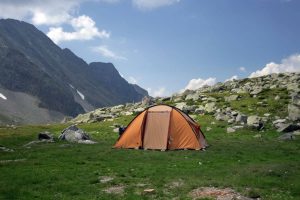Is it allowed to pitch a tent on the mountain? Can you just stay overnight in a camper van everywhere? Wild camping in the Austrian mountains can quickly lead into a maze of laws. In contrast to Scandinavia, there is no legal basis in Austria that allows camping in the wild. The regulations in this country are rather restrictive and vary greatly from state to state. The Austrian Alpine Club provides guidance.
First the good news: the mountains have been attracting more and more people looking for relaxation in nature, especially since the corona pandemic. Outdoor activities and mountain sports in general have many positive aspects. However, this trend increases the pressure on the Alps and sometimes leads to difficulties outside the well-known tourist areas. This happens, for example, where people – inspired by their individual desire for freedom – feel the need to spend the night “in the wilderness” away from the established infrastructure.
Camping in the forest
The Austrian Forest Act 1975 (a federal law) guarantees the right to free access to forests nationwide, but "camping in the dark, camping..." is expressly excluded. This means that camping in the forest is illegal throughout Austria unless the property owner has given their express consent.
Camping in alpine wasteland
"There are different legal regulations for areas above the tree line, depending on the federal state," says Liliana Dagostin, head of the department for spatial planning and nature conservation in the Austrian Alpine Association. In Carinthia, Lower Austria and Tyrol, camping outside of campsites is not permitted and violations can result in high penalties. In Upper Austria, Salzburg, Styria and Vorarlberg there is no explicit nationwide ban on wild camping, but the municipalities can impose restrictions. A prior clarification is therefore advisable. If the planned overnight stays are in protected areas, the dream of a night under the open sky will also be shattered in these federal states. The responsible protection area administrations, nature conservation and sometimes also tourism departments of the respective state governments or district administrations (district authorities) are available for information and information. A detailed overview of the legal regulations in the individual federal states can be found here: www.t1p.de/campen
Shelters instead of wild camping
“The mountain region is an ecologically sensitive area with different usage interests. That is the reason for the rather restrictive regulations in Austria,” explains Liliana Dagostin. The good news: There is a dense network of mountain huts in Austria. Although their maintenance is associated with considerable costs for the Alpine Club, mountaineers can use them inexpensively - and certainly legally. However, if you are forced to sleep outside due to an injury or a sudden change in the weather, there are no negative consequences to worry about. An unplanned alpine emergency camp (emergency bivouac) is permitted throughout Austria.
What to do when you have to go to the toilet?
The Alpine Association relies on education: "Our RespectAmBerg campaign is committed to nature and socially responsible behavior on the mountain and wants to avoid conflicts," says Liliana Dagostin. This also includes an often taboo topic that is particularly urgent when camping wild: the need to be in nature. The Alpine Association wants to help protect the sensitive high mountain area and avoid conflicts with the other inhabitants of this habitat. Under the motto "Everything sausage?!", the Alpine Club provides tips for emergencies and draws attention to the fact that what they leave behind can severely change the ecosystems in the Alps. For example, handkerchiefs take up to five years to decompose.




